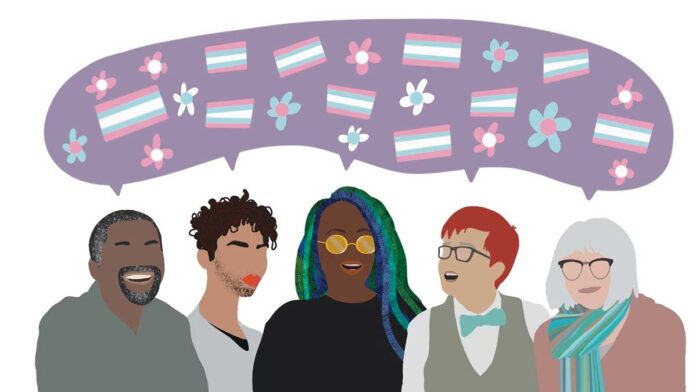The Philadelphia Trans Wellness Conference (PTWC) took place virtually from July 22-24, 2021, after having been postponed in 2020 due to pandemic safety measures. Over 3,500 people attended the conference this year, the largest trans-centric conference in the world.
“I’m really pleased with the result,” said PTWC Logistics Coordinator Dani Murano-Kinney. “There were some things that we could not have anticipated about the virtual platform. I think overall, we put together programming that we’re really proud of.” PWTC is produced by Mazzoni Center.
People from every continent attended the virtual conference, including folks from Philadelphia, Los Angeles and other major U.S. cities, Murano-Kinney said.
Among the roughly 120 professional and general track workshops were topics including barriers to healthcare for trans men, legal issues that trans and nonbinary people face in everyday life, working with neurodivergent gender-expansive people in therapeutic settings, medically-focused sessions on transmasculine, transfeminine and nonbinary gender affirmation surgeries, eroticism and the trans body, mental health as related to trans youth, resources for aging trans folks, a trans clergy-led discussion on transness and faith, and more.
“I recognized a healthy improvement from previous conferences in terms of content that was led by trans people of color,” Murano-Kinney added. “I think we need to keep pushing that because we can always be doing better.”
Rev. Celena Spain, the first openly trans Bishop of the Episcopal Apostolic church, co-facilitated the discussion about faith and spirituality. She told PGN that attendees asked her and her co-panelists how they answer questions like, “our ability to share God’s love as we know it to be, and not get discouraged, or how do we deal with the [question] – did God make mistakes,” Spain asked rhetorically. She and her colleagues Pastor Farrah and Pastor Devonte shared their varying viewpoints, but they ultimately agreed on the belief that their creator doesn’t make mistakes.
“We had to experience that part of our life, and that our transition is a part of who we are,” Spain said. “We don’t take shame in being who we are because that’s what’s made us the individual that we are today.”
Spain said that she and her colleagues discussed starting an association for trans clergy, where trans clergy members can support each other. “We talked about [how] sometimes we fail at helping and loving each other,” she added. “Sometimes we are our own critics, as far as trans-identifying individuals, sometimes we’re the harshest ones toward each other. We have to change that mindset and that trend.”
Another conference offering was a panel discussion that followed a screening of an interview with Charlene Arcila, who founded the Trans Wellness Conference in 2000 and for whom William Way’s Arcila-Adams Trans Resource Center is named. The panel featured Celena Morrison, executive director of Philadelphia’s Office of LGBT Affairs, who helmed the creation of the Arcila-Adams Trans Resource Center; Tatyana Woodard, prevention services manager for community engagement at Mazzoni Center and Qrescent Mali Mason, assistant professor of psychology at Haverford College, who conducted the original interviews with Arcila. Darius McLean, director of the Trans Resource Center, moderated the panel.
“One of the points that was brought up was around what we know about Charlene Arcila,” McLean said. “That as a community, especially Philadelphia, us being a resource for the community that has the arts and archives, the larger community should learn more about our history and learn from our trans elders while we’re here. Then as an organization what we can be doing better to preserve our collective histories.”
Jameson Pagano, Licensed Clinical Professional Counselor and Founder of Partners in Pride in Illinois, co-led the workshop on best therapeutic practices for neurodiverse trans and gender-expansive people, along with Licensed Professional Counselor Lucas DeMonte and Licensed Clinical Social Worker Tristan Connor, who also work at Partners in Pride. Debunking the stereotypes surrounding neurodiverse people popped up as a theme in those discussions.
“The goal in the past was always assimilation… helping [neurodivergent people] to assimilate within society, to learn to conform,” Pagano said. “The here and the now is, recognizing the intersectionality of all of these different identities that people have, and that assimilation is not going to be the goal. For best practice it really is helping people to embrace who they are, to recognize they aren’t alone. I think a lot of it is just normalizing [that] normal is a non-existent concept.”
Pagano added that most of his clients who are neurodivergent are also trans and gender nonbinary.
Trans activist Kendall Stephens told PGN that she appreciated the youth programming that the conference had to offer because she feels that the pandemic has been especially hard on youth.
“A lot of kids suffered, especially trans and queer youth,” Stephens said. “Not only are they trying to learn virtually, but they’re trying to learn themselves in a virtual space,” she said. “[The Trans Wellness Conference] is a place where trans youth and their caregivers can network with other parents and other trans youth, and engage in Q&A sessions to find out more about their gender journey.”
Youth-centered programming included workshops on the changing arena of trans student rights, a workshop on navigating mental health and self-care presented by staffers from The Trevor Project, and workshops on making sex education and puberty education more inclusive of queer and trans experiences, led by Philadelphia-based therapist, educator and author Rachel Simon.
Although mostly adults attended her sex education workshop along with a couple of teens, Simon told PGN that there are a lot of gaps in the sex education that American youth receive in school.
“What’s usually missing is body-first, gender-neutral language,” Simon said. “When kids go into puberty education hearing about — ‘here’s your boy body with your boy penis, and your boy anatomy,’ it really alienates other folks. It also doesn’t help cis kids either because they’re in a different room not hearing about anatomy that looks different than theirs. It leads to misunderstandings and lack of education in adults.”
Other components that Simon said are missing from sex ed are discussions on pleasure, healthy relationships and values in sexual relationships, especially in states like Pennsylvania that do not mandate medically accurate and comprehensive sex ed.
Murano-Kinney acknowledged that historically, PTWC programming has not always represented all intersections of the trans community, including queer and trans Black and indigneous people of color.
“When I came on board, I really challenged myself to do a lot of personal outreach to organizations and activists that could come in and bring those missing pieces,” they said. “We definitely saw some of that manifest in the conference. It’s an opportunity to keep pushing for 2022, to keep broadening what we present each year, and to keep showing new aspects of the trans experience.”
Stephens said that she saw greater representation in this year’s conference.
“Some of the problematic issues of there not being enough Black and Brown representation and the leadership being very cisgender-heavy, I’ve seen a reversal of that and the conference looking more like it was intended to look like.”

